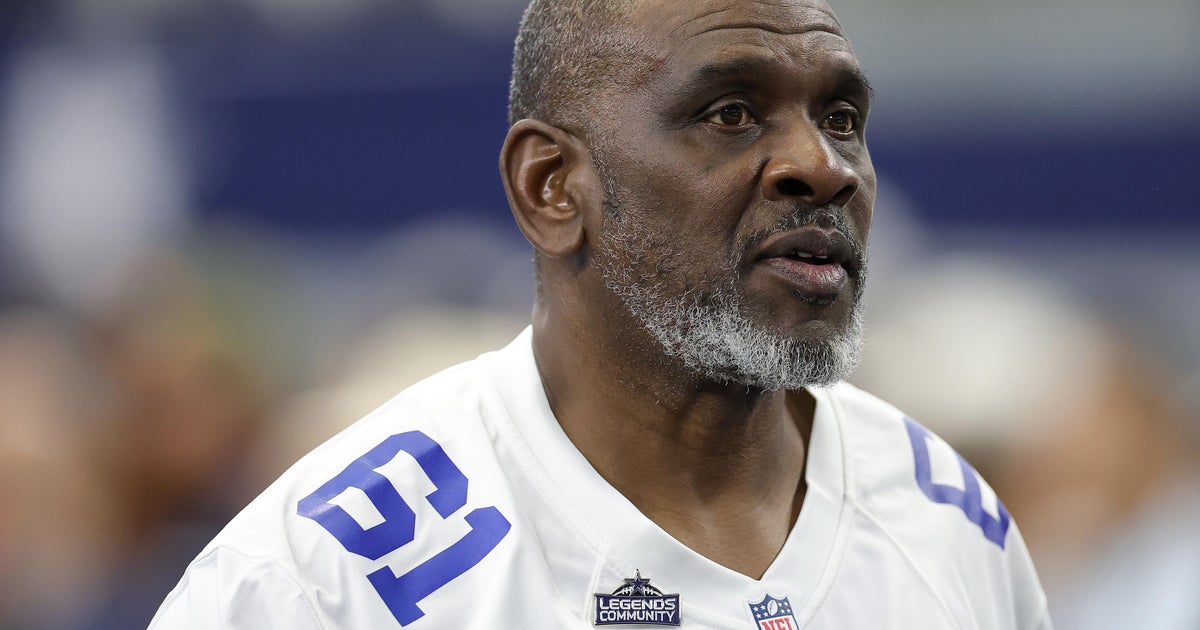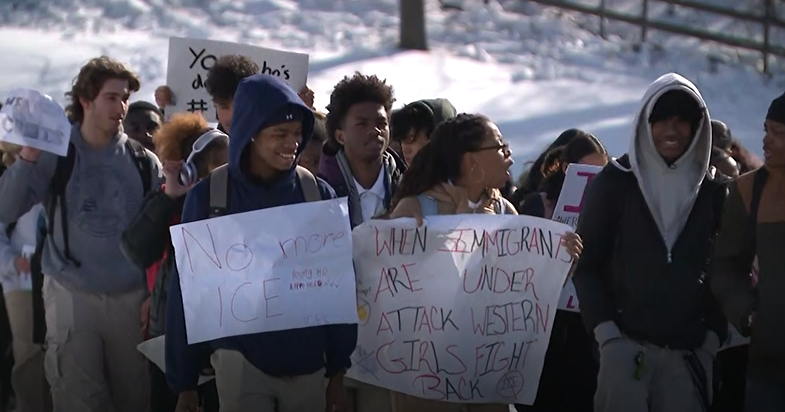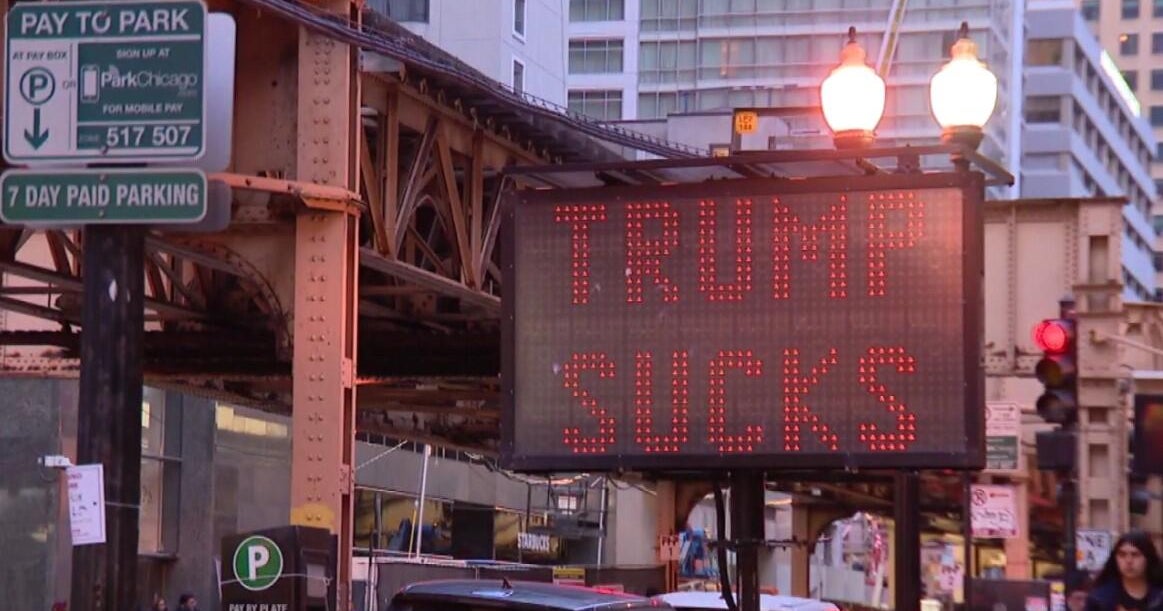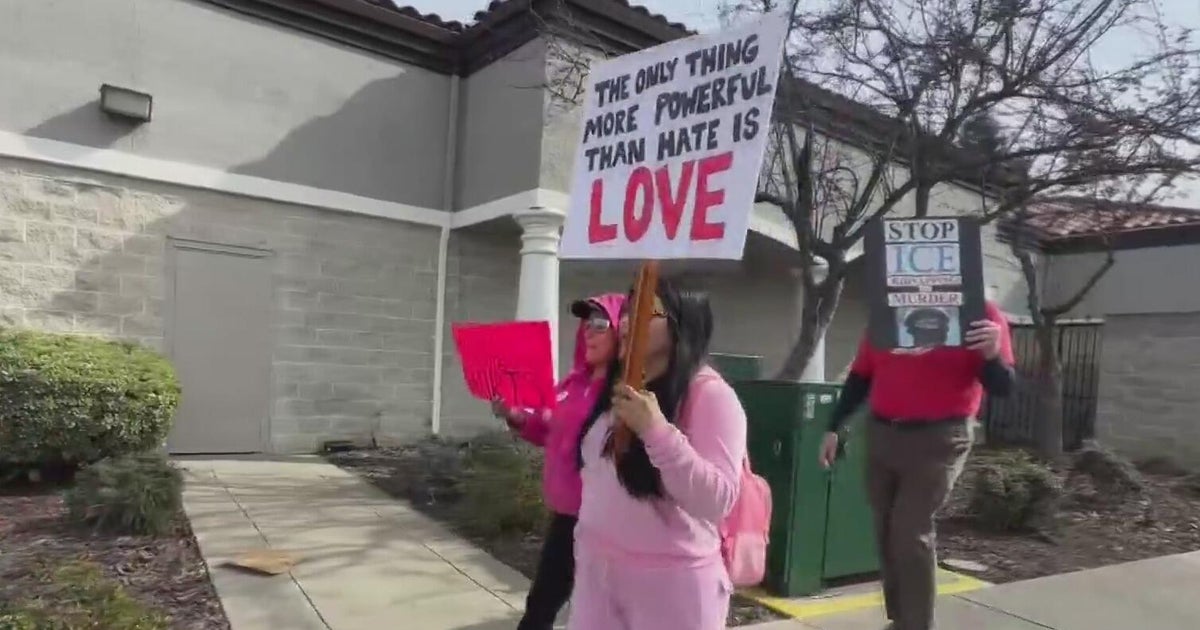Trump: 'The Time Is Overdue To Develop A New Screening Test'
YOUNGSTOWN, Ohio (CBSNewYork/AP) --Hillary Clinton and Donald Trump began the work week fighting for attention, and for Donald it's a fight to pick up steam in the polls.
Trump unveiled his plan to destroy ISIS, while Hillary was joined by Joe Biden.
Donald Trump called for a new ideological test for admission to the United States in a foreign policy address he delivered in the swing state of Ohio on Monday.
The anti-terror speech was seen as critically important if Donald wants to turn the tide in the race for the White Hosue.
The Republican presidential nominee said he wants immigration applicants vetted on their stance on issues like religious freedom, gender equality and gay rights. The policy would represent a significant shift in how the U.S. manages entry into the country.
COMPLETE CAMPAIGN 2016 COVERAGE
"In the Cold War, we had an ideological screening test. The time is overdue to develop a new screening test," Trump said, calling it "extreme vetting."
Trump stated that those who do not believe in the U.S. Constitution, and who support bigotry and hatred, will not be allowed into the country.
"We should only admit into this country those who share our values and respect our people," he said.
Trump claimed that many recent terror attacks in the U.S. have been carried out by immigrants or the children of immigrants.
He said he would temporarily suspend immigration from nations with a history of "exporting terrorism" and would ask the State Department for a list of regions where screening is not currently adequate.
"We will have to temporarily suspend immigration from some of the most dangerous and volatile regions of the world," Trump said about putting his new immigration policy in place.
During his speech, Trump said he will put an end to nation-building if elected president.
"It is now time for a new approach. Our current strategy of nation-building and regime change is a proven absolute failure," Trump said, citing the unpopular Iraq war. "What was the purpose of this whole thing?
"It's time to put the mistakes of the past behind us and chart a new course."
Trump said he will work with U.S. allies, including in the Middle East, to defeat radical Islamic terrorism.
"As president, I will call for an international conference focused on this goal. We will work side-by-side in our friends in the Middle East, including our greatest ally Israel," Trump said, adding that his administration would work closely with NATO on this new mission.
He also said he would work with Russia to defeat the Islamic State of Iraq and Syria.
"I also believe we can find common ground with Russia in the fight against ISIS. Wouldn't that be a good thing? They, too, have much at stake with their outcome in Syria," Trump said.
Trump said a key component of his foreign policy would be "halting" the spread of "radical Islamic terrorism" by limiting their access to the Internet.
"We cannot allow the Internet to be used as a recruiting tool," he told supporters.
Trump took aim at President Barack Obama and Democratic presidential nominee Hillary Clinton, saying their policies "unleashed ISIS" and destabilized the Middle East.
He also criticized Clinton's stamina, suggesting she isn't strong enough to be president.
"She also lacks the mental and physical stamina to take on ISIS and the many adversaries we face," Trump said.
Trump warned that Clinton's immigration policy would be the same as Germany's.
"Hillary Clinton wants to be America's Angela Merkel and you know what a disaster this massive immigration has been to Germany and the people of Germany," Trump said. "It is a catastrophe."
According to the BBC, Germany has struggled to deal with Syrian refugees pouring into the country, as Germany recorded more than 1.1 million foreign nationals in 2015.
While Trump has been harshly critical of Obama's handling of the threat posed by ISIS, his own policies for defeating the group remain vague. His most specific prescriptions centered on changing U.S. immigration policy to keep potential attackers from entering the country.
Trump's campaign aides said the new ideological test for admission to the United States would vet applicants for their stance on issues like religious freedom, gender equality and gay rights. The government would use questionnaires, social media, interviews with friends and family or other means to determine if applicants support American values like tolerance and pluralism. The U.S. would stop issuing visas in any case where it cannot perform adequate screenings.
Trump did not clarify how U.S. officials would assess the veracity of responses to the questionnaires or how much manpower it would require to complete such arduous vetting. Nor did the campaign say whether additional screenings would apply to the millions of tourists who spend billions of dollars visiting the United States each year.
The Republican nominee's foreign policy address comes during a rocky stretch for his campaign. He's struggled to stay on message and has consistently overshadowed his policy rollouts, including an economic speech last week, with provocative statements, including his comments falsely declaring that Obama was the "founder" of the Islamic State.
Trump spent much of the speech building a case that Obama and Clinton are to blame for the creation of the terror group that has roiled the Middle East and carried out attacks in the West. He specifically highlighted the withdrawal of U.S. troops from Iraq in late 2011, arguing the move created a vacuum for terror groups to thrive.
Reiterating a favorite criticism of Republicans, Trump also panned the Obama administration for not using the phrase "radical Islamic terrorism" to describe sympathizers.
Obama, Clinton and top U.S. officials have warned against using that kind of language to describe the conflict, arguing that it plays into militants' hands.
Trump's immigration proposals were the latest version of a policy that began with his unprecedented call to temporarily bar foreign Muslims from entering the country -- a religious test that was criticized across party lines as un-American. Following a massacre at a gay nightclub in Orlando, Florida, in June, Trump introduced a new standard, vowing to "suspend immigration from areas of the world where there is a proven history of terrorism against the United States, Europe or our allies, until we fully understand how to end these threats."
That proposal raised numerous questions that the campaign never clarified, including whether it would apply to citizens of countries like France, Israel, or Ireland, which have suffered recent and past attacks. Trump had promised to release his list of "terror countries" soon. But aides say the campaign needs access to unreleased Department of Homeland Security data to assess exactly where the most serious threats lie.
CBS2's Jessica Layton reported the Siena Research Institute has Clinton ahead by 30 points -- 57 to 27 percent.
A new CBS News poll also shows Clinton leading in the swing states of New Hampshire, Florida and Georgia.
One comment gaining a lot of traction came from former New York City Mayor Rudy Giuliani.
Before introducing Trump in Ohio, he claimed there were "no successful radical Islamic terrorist attacks" against the U.S. in the eight years before Obama took office.
Giuliani was mayor when more than 3,000 people were killed on Sept. 11, 2001.
Ahead of Trump's address, Clinton and Vice President Joe Biden vigorously challenged the Republican nominee's preparedness to be commander in chief in Scranton, Pennsylvania. Biden called Trump's views "dangerous" and "un-American" and warned that Trump's false assertions last week about Obama founding ISIS could be used by extremists to target American service members in Iraq.
"The threat to their life has gone up a couple clicks," he said.
"Donald's been all over the place on ISIS. he talked about Syria being a free zone for ISIS, a major country in the Middle East that could launch attacks on us and others," she said.
In North Carolina, Clinton's running mate Tim Kaine warned voters not to be tricked by Trump.
"The people who believe Donald Trump end up getting hurt by Donald Trump, and we're not gonna let him hurt the United States of America," Kaine said.
It's been a war of words between campaigns when it comes to winning the war against ISIS.
Missing from Trump's speech was any mention of a total ban on Muslims like he has called for in the past.
(TM and © Copyright 2016 CBS Radio Inc. and its relevant subsidiaries. CBS RADIO and EYE Logo TM and Copyright 2016 CBS Broadcasting Inc. Used under license. All Rights Reserved. This material may not be published, broadcast, rewritten, or redistributed. The Associated Press contributed to this report.)







